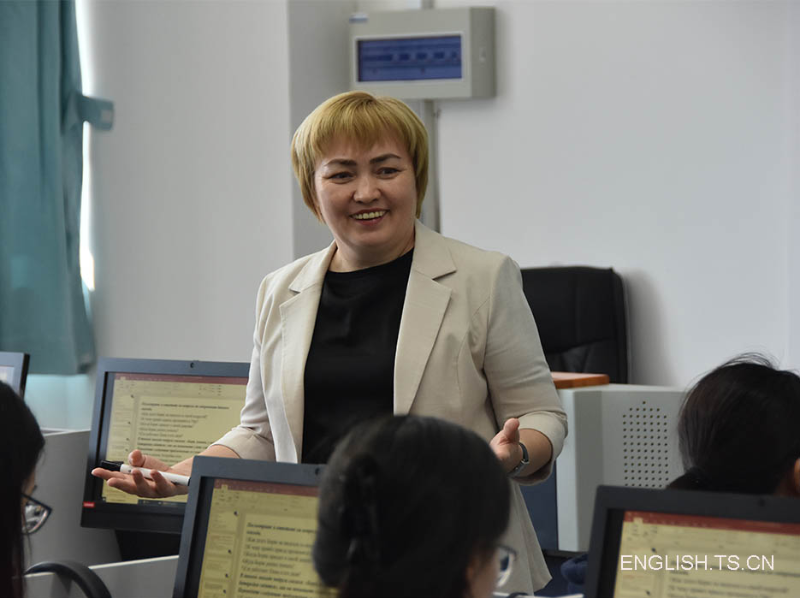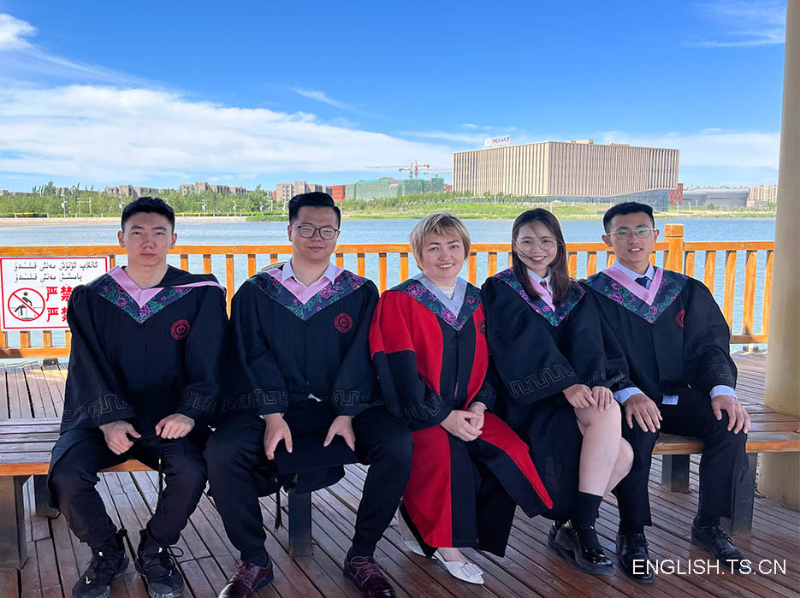My name is Gulnara Tolmacheva. I have been living in China’s Xinjiang Uygur Autonomous Region for more than 10 years. I love it here.
In 2013, I came to Xinjiang University to study Chinese language and literature. Chinese language and culture are both fascinating and mysterious to me. I have been learning Chinese and exchanging ideas with my classmates to foster a deeper understanding of one another. I find that the way Chinese people celebrate birthdays is different from Russians. I often find it confusing when trying to figure out when my friends’ birthdays actually are because many holidays in China, including some people’s birthdays, are observed according to the lunar calendar.

Photo shows Gulnara Tolmacheva in class at China University of Petroleum-Beijing in Karamay, Xinjiang Uygur Autonomous Region, China.
I have also discovered more secrets, such as the importance of garnishing dishes with different colors. Speaking of celebrating the Spring Festival, or the Chinese New Year, I think it deserves a special mention. One morning at 8 o’clock Beijing time, I was startled awake by a loud explosion sound and sat up in bed, wondering what was happening. You know, we start our work at 10:00 in the morning in Xinjiang. It turned out that my neighbors were starting their Spring Festival celebrations by setting off firecrackers. Most traditional Chinese festivals come with impressive unique delicacies like mooncakes for the Mid-Autumn Festival and zongzi for the Dragon Boat Festival.
People in Xinjiang love working and enjoy holidays. When it is the Spring Festival and the Mid-Autumn Festival, people in Xinjiang will get days off. So is it with the Corban Festival, also known as Eid al-Adha, the Roza Festival, or Eid al-Fitr, and others, for local Muslims. This reflects the government’s equal respect for local people’s traditional ethnic cultures.
One of my favorite things is that the Han Chinese use their full names to refer to their Uygur, Kazak and Mongolian compatriots, while respecting their cultures, customs and traditions. Here, most of the ethnic minority residents can speak fluent Mandarin, and at the same time, they also retain their own language, cultural traditions and customs. In the park, people of various ethnic groups dance to the music, and the scene often makes me intoxicated.

Photo shows Gulnara Tolmacheva discusses issues related to Russian teaching with other teachers at China University of Petroleum-Beijing in Karamay, Xinjiang Uygur Autonomous Region, China.
Xinjiang is a wonderful place where people live in harmony and embrace each other regardless of their ethnicity, identity, or social status. People say that if you respect your own culture, you will surely respect others’ cultures as well.
Xinjiang has a good living atmosphere and convenient infrastructure. People have good working conditions and can rely on their own efforts to earn money to buy houses, cars and travel tours. Kindergartens, primary and secondary schools, and universities are well organized. People of all ethnic groups in Xinjiang work hard to promote social progress and create a happy life, because as long as you are willing, everything is possible, and the conditions are ready and available to everyone at any time.

Photo shows Gulnara Tolmacheva with students of the Class of 2022 of China University of Petroleum-Beijing in Karamay, Xinjiang Uygur Autonomous Region, China.
I have noticed that the Asia-Pacific Economic Cooperation (APEC) Leaders’ Summit 2023 is about to be held this week. I believe this is good news for people around the world who love peace and pursue development, especially for the continuous growth of Sino-Russian relations. The relationship between these two countries has been advancing in various aspects, such as economy, education, culture, and others, which brings me great joy. I hope that China and Russia can achieve higher levels of economic cooperation and cultural exchanges, which will bring numerous benefits to their respective peoples while also contributing to global stability and development.
(Gulnara Tolmacheva teaches Russian at the China University of Petroleum-Beijing in Karamay, China's Xinjiang Uygur Autonomous Region.)
Planner : Jie Wenjin
Reviewers : Hou Weili and Cheng Li









